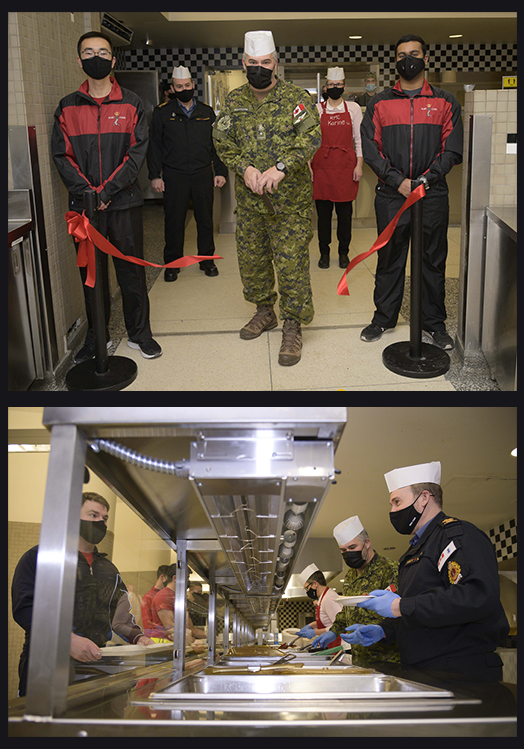
Photos by Corporal Brandon James Liddy, RMC Public Affairs
Who would think that modernizing a kitchen would improve environment protection and have such a tremendous positive impact on the health, safety and a renewed sense of pride amongst its staff?
As a result of work by Defence Construction Canada, the Canadian Defence Academy, and the Canadian Forces Real Property Operations Detachment Kingston, $27M was invested into the Cadet Dining Hall (CDH) kitchen at Royal Military College (RMC) to increase both food production capacity and environmental protection.
The significant investment provides a safer working and food service environment, improved food quality, and two large food waste digesters that neither cause methane nor create any odor thereby contributing to a better breathing environment for the kitchen staff and lessen the amount of waste.
By treating the food waste on site, "the bio digesters are reducing the carbon footprint” explained Solutions Foodservices Group's Sandra MacInnis, who provided an overview to the kitchen staff on how to operate the digesters at RMC.
Over 1,100 naval and officer cadets of the Regular Officer Training Plan (ROTP), 800 sea cadets of HMCS Ontario and RMC's hardworking kitchen staff will benefit from an improved food production area, bigger and safer servery, new HVAC system, and reduction in noise level to name a few improvements.
“Designed in 1957 to feed 500 student and subsequently for 800, the upgrades to this kitchen have been a very long time coming, and it’s a real boost to everyone’s moral,”
In normal times, RMC's CDH is the second busiest Mess Hall in the Canadian Armed Forces (CAF). On any given day, CDH kitchen serves over 3,300 meals a day and provides extra meals and box lunches for RMC's varsity teams.
Applicants who wish to join ROTP students should submit their application as soon as possible through Forces.ca. Offers will be made in May, and training will begin in June.
Get social with RMC on Facebook, Twitter, Instagram, flickr and on the CAF YouTube Channel.
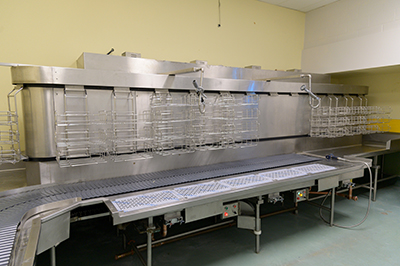 The dish return conveyor – trays are put onto the conveyer, which in turn brings the tray around to the staff for sorting. The new grey conveyor belt was installed to allow more weight. This allows plates to be sorted, stacked, and then gets moved along to the dishwasher area without fear of losing items through gaps that used to exist. It is a self-cleaning system that keeps the flow moving as well as clean and sanitary.
The dish return conveyor – trays are put onto the conveyer, which in turn brings the tray around to the staff for sorting. The new grey conveyor belt was installed to allow more weight. This allows plates to be sorted, stacked, and then gets moved along to the dishwasher area without fear of losing items through gaps that used to exist. It is a self-cleaning system that keeps the flow moving as well as clean and sanitary. 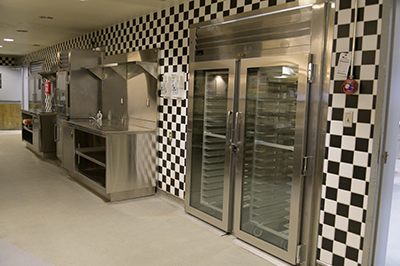 The new warmers - have glass doors that allow better vision into the cabinet which in turn conserves heat by not having to open the doors unnecessarily to view what products are inside. The cabinets are also twice the size as the old ones, which allows for more food to be held at proper temperature, which in turn allows the kitchen staff to prepare more food at a time reducing wait time for the replenishment of the serving line.
The new warmers - have glass doors that allow better vision into the cabinet which in turn conserves heat by not having to open the doors unnecessarily to view what products are inside. The cabinets are also twice the size as the old ones, which allows for more food to be held at proper temperature, which in turn allows the kitchen staff to prepare more food at a time reducing wait time for the replenishment of the serving line.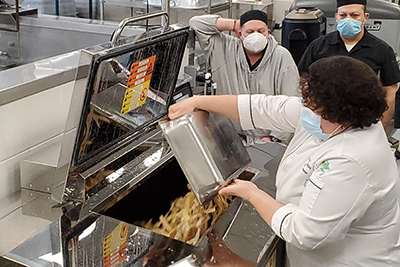 Solutions Foodservices Group's Sandra MacInnis providing an overview to the kitchen staff on how to operate the bio digesters, which are reducing the carbon footprint by treating the food waste on site.
Solutions Foodservices Group's Sandra MacInnis providing an overview to the kitchen staff on how to operate the bio digesters, which are reducing the carbon footprint by treating the food waste on site. 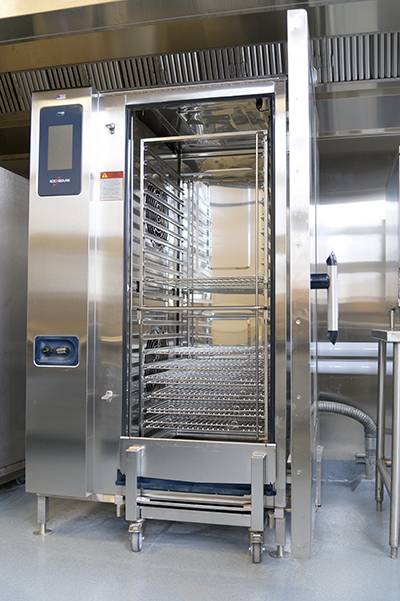 New combi oven - provides more options to preparing food, with options to use dry heat, steam or a combination of both. The user can also program recipes into the machine that coincides with the cycle menu as well so that products are consistently prepared. The oven can bake, roast, sear, proof, cook pasta and can even cook the perfect steak! It is truly an asset.
New combi oven - provides more options to preparing food, with options to use dry heat, steam or a combination of both. The user can also program recipes into the machine that coincides with the cycle menu as well so that products are consistently prepared. The oven can bake, roast, sear, proof, cook pasta and can even cook the perfect steak! It is truly an asset.